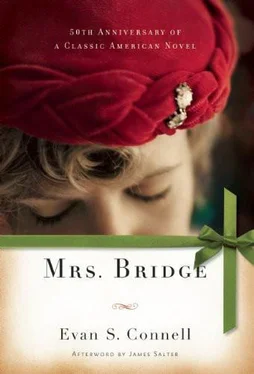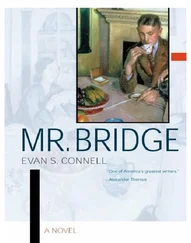She also thought about Stuart Montgomery and how the affair must have affected him. She saw him in Kansas City as a tall, leathery man with a hard, bulbous face like those carved on bottle openers or on the knobs of canes. He did not have much to say if she chanced to meet him on the street with his odd yellow briefcase, and when he tipped his hat he seldom bothered to smile. She wondered if he had wept when he learned what had happened, and If he tried to apologize for having allowed her to go home alone that night, or whether he had been with her and had been frightened away by the man’s gun. Or had he been struck over the head? Did he still respect her?
Mrs. Bridge wanted to make some gesture to tell Lois Montgomery how she sympathized, but, after all, what could be done when no one ever mentioned It and when Lois simply stood there smiling and chatting and eating crabmeat sandwiches like everyone else?
During one of the luncheons she got to talking with Grace Barron about art, the result being that the two of them left the clubhouse and drove to the William Rockhill Nelson art gallery and stayed there till it closed. Mrs. Bridge felt excited and guilty about the way they had gone off by themselves, but it was how Grace did everything.
Goya, Holbein, Diirer, Corot these names, at once so familiar and so meaningless to Mrs, Bridge, were old friends of Grace Barron. And before long Mrs. Bridge knew this was a day to be remembered, like a day in February when, after months of lowering skies, the clouds roll back.
A little self-conscious still, not yet ready to let Grace know what she was intending to do, Mrs. Bridge enrolled in a painting class for adults at an art school near the gallery. She bought a kit which contained some paints and brushes, a palette she had thought all palettes were of that peculiar ornamental shape and was slightly disappointed to find the one in her kit was plainly rectangular and a bottle of linseed oil and a bottle of turpentine, along with two metal cups which the clerk told her were to be used for the turpentine and the oil. She also bought a sugar sack for wiping the brushes, and a smock embroidered with bluebirds, and thus equipped she began her art lessons three evenings a week. She attended regularly for almost a month, skipped one night, got to several more, skipped three, attended spasmodically for another month, and finally dropped out altogether. But while she did paint she painted with a certain gusto and feeling, and with not a bad eye. The instructor once or twice gave her nice compliments and encouraged her to continue. He was a morose and rumpled little man of about forty with strong breath and bags under his eyes, who was in the habit of scratching his head and saying, “Well, let’s see, folks, to-night why don’t w r e sort of let ourselves go?”
Occasionally there would be a model in costume, often an elderly immigrant in boots and a kerchief; sometimes they would paint an arrangement of driftwood and wine bottles. But one evening the instructor, whose name was Gadbury, told them to try a subject from mythology and work from imagination. He suggested Wotan as a subject, but added that they might do anything they wished. Mrs. Bridge could not recall anything about Wotan, but she did remember with stark clarity the legend of Leda and the swan. She proceeded to paint a small, zinc-white swan and a Leda standing stiffly erect, with hands behind her back and ankle-deep in water because hands and feet always gave her trouble, and she clothed Leda in a flowered dressmaker bathing suit not unlike her own.
Mr. Gadbury, making his rounds, stood for a while looking over her shoulder at this Leda and at last said he thought the lake was too blue.
She spent a great deal of time staring into space, oppressed by the sense that she was waiting. But waiting for what? She did not know. Surely someone would call, someone must be needing her. Yet each day proceeded like the one before. Nothing intense, nothing desperate, ever happened. Time did not move. The home, the city, the nation, and life itself were eternal; still she had a foreboding that one day, without warning and without pity, all the dear, important things would be destroyed. So it was that her thoughts now and then turned deviously deeper, spiraling down and down in search of the final recess, of life more immutable than the life she had bequeathed in the birth of her children.
One fathomless instant occurred on a windy, rainy night when Harriet had gone to church, and the children were out, and only she and her husband remained at home. For some time, perhaps an hour or more, they had been reading, separately; he had the financial page of the newspaper and she had been idly reading of the weddings that day. The rain blew softly against the windowpanes, shutters rattled, and above the front door the tin weather stripping began to moan. Mrs. Bridge, with the newspaper in her lap, listened to the rumbling and booming of thunder over the house. Suddenly, in total quiet, the room was illuminated by lightning. Mr. Bridge lifted his head, only that and nothing more, but within Mrs. Bridge something stirred. She looked at her husband Intently.
“Did the clock strike?” he asked.
“No, I don’t believe so/* she answered, waiting.
He cleared his throat. He adjusted his glasses. He continued reading.
She never forgot this moment when she had almost appre-hended the very meaning of life, and of the stars and planets, yes, and the flight of the earth.
The one person she ever met who surely had experienced similar moments was a Russian-Italian-Hungarian countess who passed through Kansas City like a leaf in the wind.
“The Countess Mariska Mihailova Strozzi,” was how Lois Montgomery, who was the newly elected president of the Auxiliary, introduced her at luncheon.
“Ladies,” the countess began, and went on talking for an hour, but it was an hour that seemed like a minute. No one whispered, no one left the room. The countess was electrify-ing, and the women who missed hearing her were told about her for months afterward. She was born in Shanghai, the daughter of an elderly Russian diplomat who, until an intrigue at the court, had been a close friend of Czar Nicholas II. The family had been exiled, there had been murders, abductions, espionage, and no one knew what else. At fourteen she was married to an Italian millionaire who claimed direct descent from the great Renaissance family which opposed the Medici, but she had run away from him. Later she married a rich Greek. Now she was divorced and on her way to San Francisco at the invitation of a munitions maker. She talked of her experiences, but mostly of the Nazis, and there was a rumor that just before coming to America she had killed a Nazi colonel with his own revolver. Mrs. Bridge, sitting in the front row, looking up into the glittering violet eyes, could easily believe it.
The countess was quite small and chic, and wore a black sheath dress. Her only jewelry was a large star sapphire that accentuated a strange bluish-white scar across the back of her hand. Mrs, Bridge was certain everyone was dying to know what had caused the scar, but no one dared ask. It was only one of the mysteries of the countess. She was delicate and utterly feminine, but at the same she was as blunt as a man. It was clear she had been witness to many kinds of folly and wisdom and agony and joy. Once she paused and leisurely fitted a European cigarette into an ebony holder; several minutes must have gone by while she smoked and stared over the heads of her audience, but they were so transfixed that no one moved. Tamping out the cigarette, she continued in her perfect, heavy English, “We must destroy the Fascist….”
Читать дальше












